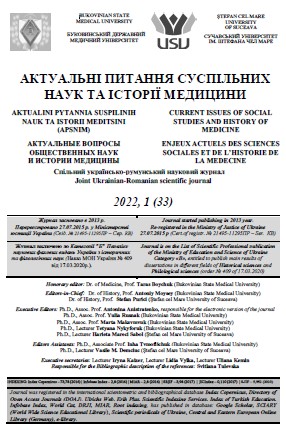ПРО ЗМІНИ ВИКЛАДАННЯ ІНШОМОВНОЇ КУЛЬТУРИ В УКРАЇНСЬКИХ ВУЗАХ
ON CHANGES IN THE TEACHING OF FOREIGN CULTURE IN THE UNIVERSITIES OF UKRAINE
Author(s): Valentyna NichyiSubject(s): Foreign languages learning, Language acquisition, Higher Education , Pedagogy
Published by: Видавництво ВДНЗ України « Буковинський державний медичний університет »
Keywords: foreign languages; communication-oriented approach; foreign language culture; educational process;
Summary/Abstract: The purpose of the article is to analyze the features of teaching foreign languages in Ukrainian universities. To achieve this goal, the article uses the methods of critical analysis of scientific resources and scientific observation of the educational process, theoretical analysis. A comprehensive description of the application of these methods through the prism of foreign languages ‒ is the scientific novelty of the work. For the first time the stages of language training, their application in practice for mastering a foreign language culture are analyzed. The main purpose of learning a foreign language in modern conditions is to form students' ability to communicate in any language at any level, which allows them to enter into equal dialogue with other cultures and traditions, participate in various spheres of intercultural communication, join modern world civilization. This goal involves the development of students with a high level of communicative competence, which will allow, in accordance with their real needs and interests, to successfully and efficiently carry out speech communication in various fields. The method of learning a foreign language is a system of knowledge about the natural processes of its study and ways to influence this process in order to optimize it. There are two functionally different techniques: general and specific. The general technique is devoted to the study of the features and patterns of the process of learning a foreign language, regardless of the language in question. For example, the principles of selection of educational material, the correlation of oral and written language at different stages of the lesson will be the same in equivalent learning conditions for any Western European language. Conclusions. Today, more and more teachers use elements of a communicative-oriented approach in foreign language lessons. As a result of this approach in teaching, a system of foreign language proficiency is formed, implemented and operates as a means of communication in the broadest sense of the word. This approach also includes the development of skills to compare the linguistic phenomena of the native and foreign languages.
Journal: Актуальні питання суспільних наук та історії медицини
- Issue Year: 2022
- Issue No: 1
- Page Range: 115-118
- Page Count: 4
- Language: Ukrainian

